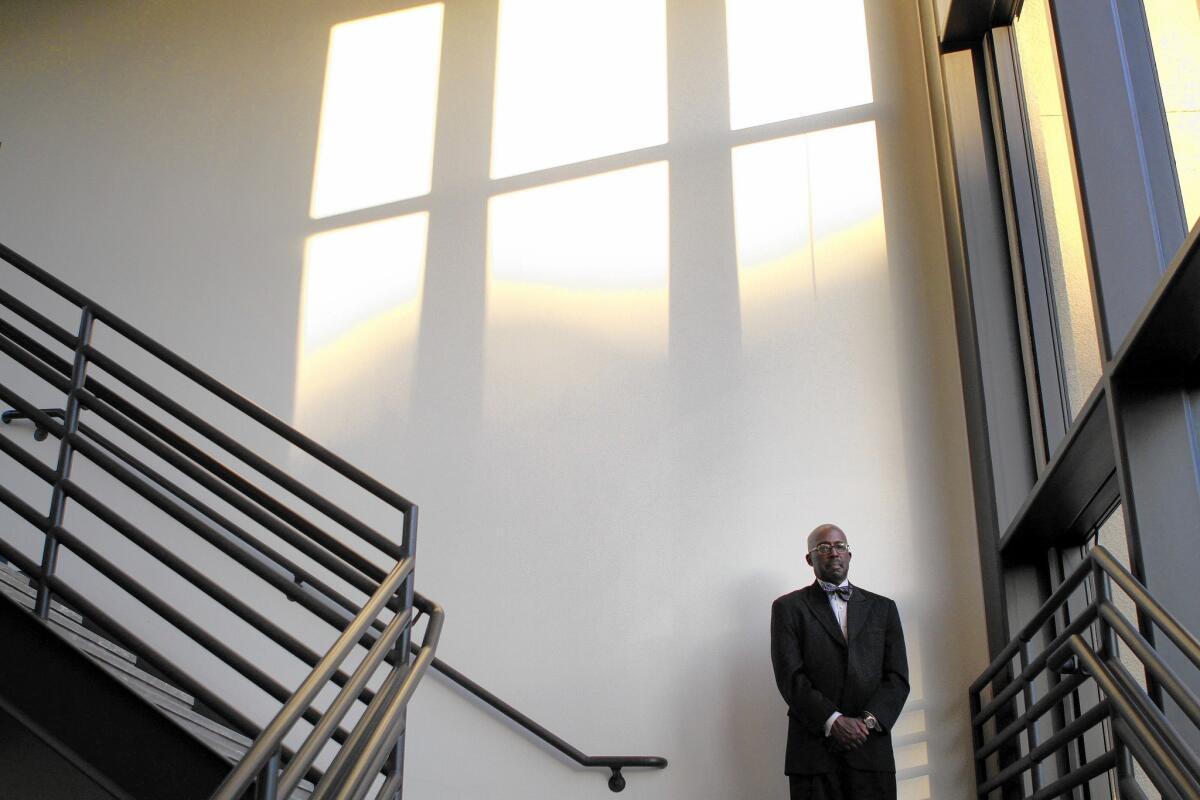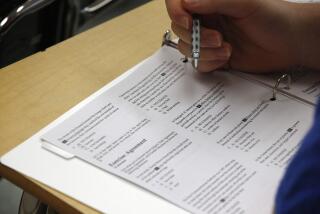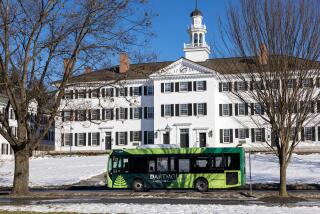As fewer Californians pass the bar, are LSAT scores an early indicator of success?

Already faced with one of the lowest bar passage rates in the country, California students and academics shouldn’t expect those statistics to improve over the next several years, according to a new study that examines the link between standardized test scores and bar passage rates.
In July 2014, only 48.6% of test-takers passed the California bar; nearly 8,500 took it. Historically, the state has one of the hardest to pass bar exams in the nation, but last summer was the first time in almost a decade that the success rate fell below half.
“It’s not going to get better,” said Kyle McEntee, executive director of Law School Transparency, the advocacy group that conducted the study. “If anything, it’s going to get worse.”
Research has found that the LSAT is a key predictor of bar performance. But some school administrators dispute those findings, saying results on the 180-point LSAT don’t necessarily indicate success on the bar.
McEntee is pessimistic because the number of California schools that admit a high number of students who scored below 150 on their law school admission test is growing.
Eight out of California’s 21 law schools have recently admitted classes that have a “high,” “very high” or “extreme” number of students who have a poor chance of passing the bar, based on their LSAT scores, the study showed.
Nationwide, about a third of the 204 nationally accredited law schools had similar incoming law classes.
The study defined high-risk students as those who scored below 150 on the LSAT. Law schools are required to disclose these test scores for incoming students as well as bar passage rates.
The study did not address law schools that are not accredited by the American Bar Assn. California has more of those schools than any other state in the nation; only about 16% of graduates from those schools who took the California bar in July 2014 passed.
The California bar is offered twice a year; most law school graduates take the bar in July. The results for the summer 2015 test are not yet available.
The number of schools that accept students with low LSAT scores is growing, according to the study. Four years ago, 30 schools accepted classes with at least a quarter of students scoring below 150. In 2014, there were 74 such schools.
“You’ve really got several dozen schools who are admitting students who wouldn’t have got into any law school five years ago,” said Paul Campos, a law professor at the University of Colorado, Boulder who has written about legal education. “The numbers are quite striking.”
In California, three schools were given the highest, “extreme,” risk rating: the Thomas Jefferson School of Law in San Diego, the University of La Verne College of Law and Whittier Law School.
About 33% of all Thomas Jefferson graduates who took the July 2014 bar passed. The school charges $44,900 annually for full-time students, and the median LSAT score of the most recent first-year class was 145, according to disclosure forms.
Thomas Jefferson administrators did not respond to a request for comment.
Slightly more Whittier Law School graduates than Thomas Jefferson alumni passed the July 2014 bar, according to state bar data. Tuition at Whittier is $42,400 for full-time students, and the median LSAT score is 146.
Penelope Bryan, Whittier’s dean, said in an email that the school hires a statistician each year to review alumni bar results to see whether there are any factors that lead to failure.
“The LSAT score has no predictive value for the success of Whittier Law School students on the bar exam,” Bryan said.
Instead, Bryan said, students’ performance in the school’s bar prep courses is a better predictor of whether they pass the test.
“The claim that students with lower LSAT scores have no hope of passing a bar exam is patently false,” she said.
Gilbert A. Holmes, dean of the University of La Verne law school, said the study was too narrowly focused.
See the most-read stories this hour >>
“For them to think that the LSAT is a predictor when there’s [up to] four years of intervention by a law school is more than a little bit misleading,” Holmes said.
About 42% of La Verne graduates passed the 2014 bar, slightly below the state average, but two-thirds of first-time test-takers passed, about five points above the average.
Holmes said LSAT scores aren’t a predictor of whether a La Verne student will pass the bar. “We have three years to work with them,” he said.
La Verne graduates who took the July 2014 bar and scored a 156 or higher on their LSAT passed the test at approximately the same rate as students with 150 or lower on their standardized test, Holmes said.
At UC Berkeley, which had an 88% first-time bar passage rate in July 2014, the median LSAT score of the latest class was 167, according to disclosure forms. In-state tuition there is $48,166.
U.S. Sen. Charles E. Grassley (R-Iowa), who chairs the Senate Judiciary Committee, said he was “troubled” by the study.
“We need to move away from a system that results in too many law school graduates twisting in the wind. Leaving law school indebted to the federal government and in a position that may lead to defaulting on loans isn’t good for the graduates, and it isn’t good for the taxpayers,” Grassley said in a statement.
McEntee said LSAT performance is one of the only concrete pieces of information that admissions officers can weigh and that the drop in those scores is troubling. He said he hopes national accrediting boards take action to make law schools raise their standards.
“This is worse than I expected,” McEntee said. “We expect more from a profession, we expect more from an educational organizations.”
jason.song@latimes.com
Twitter: @byjsong
ALSO
Cleaning out Big Tujunga Wash: Whose job is it?
El Niño ‘is here, and it is huge,’ as officials race to prep for winter
Steve Lopez: What’s wrong with L.A. Unified’s leadership? Answer: Just about everything
More to Read
Start your day right
Sign up for Essential California for news, features and recommendations from the L.A. Times and beyond in your inbox six days a week.
You may occasionally receive promotional content from the Los Angeles Times.






